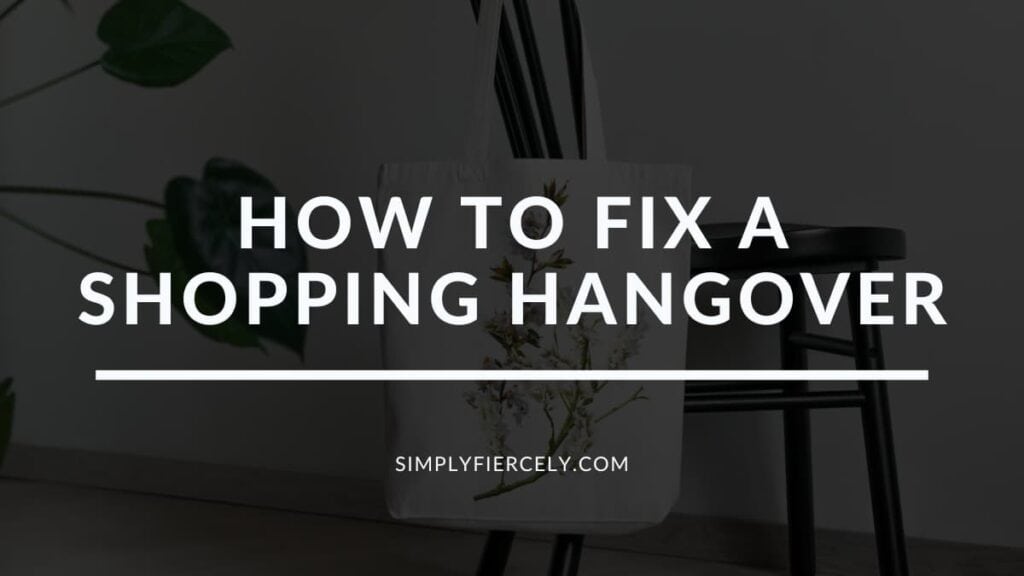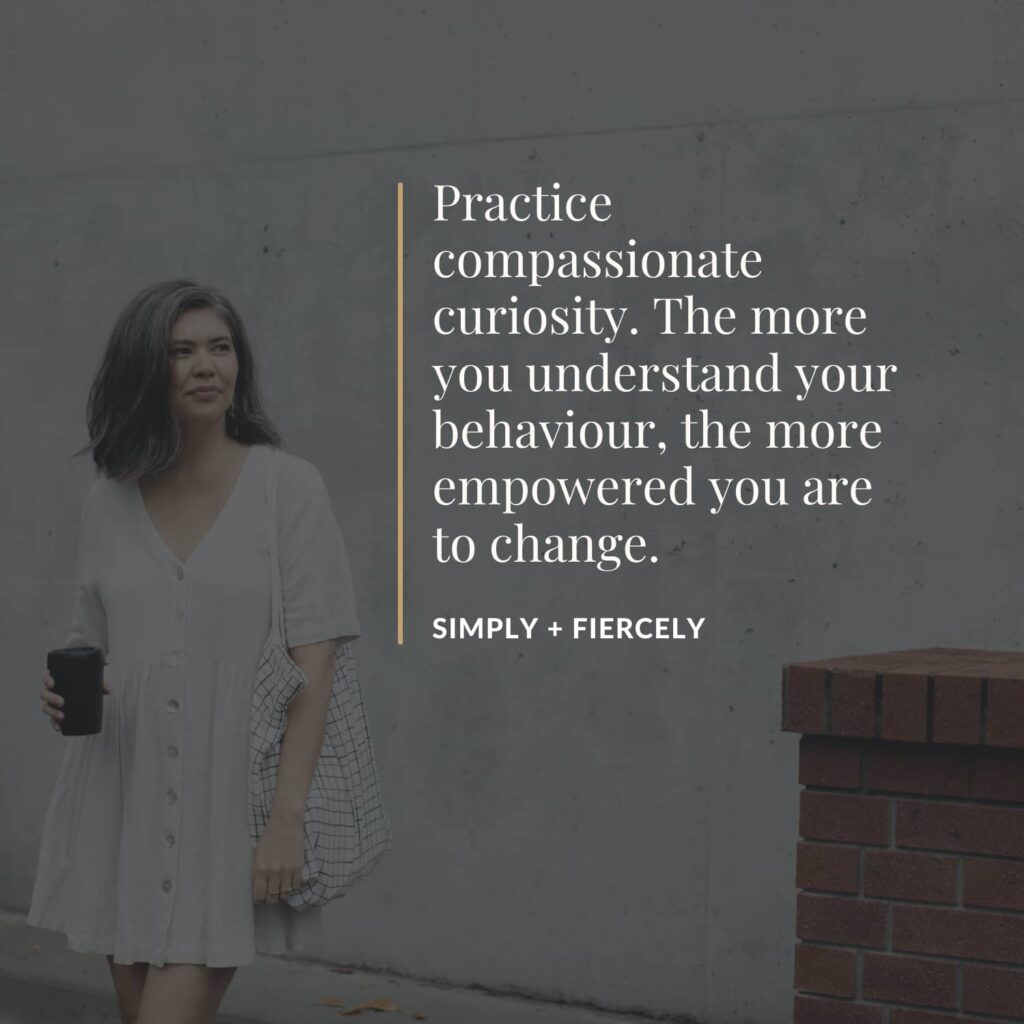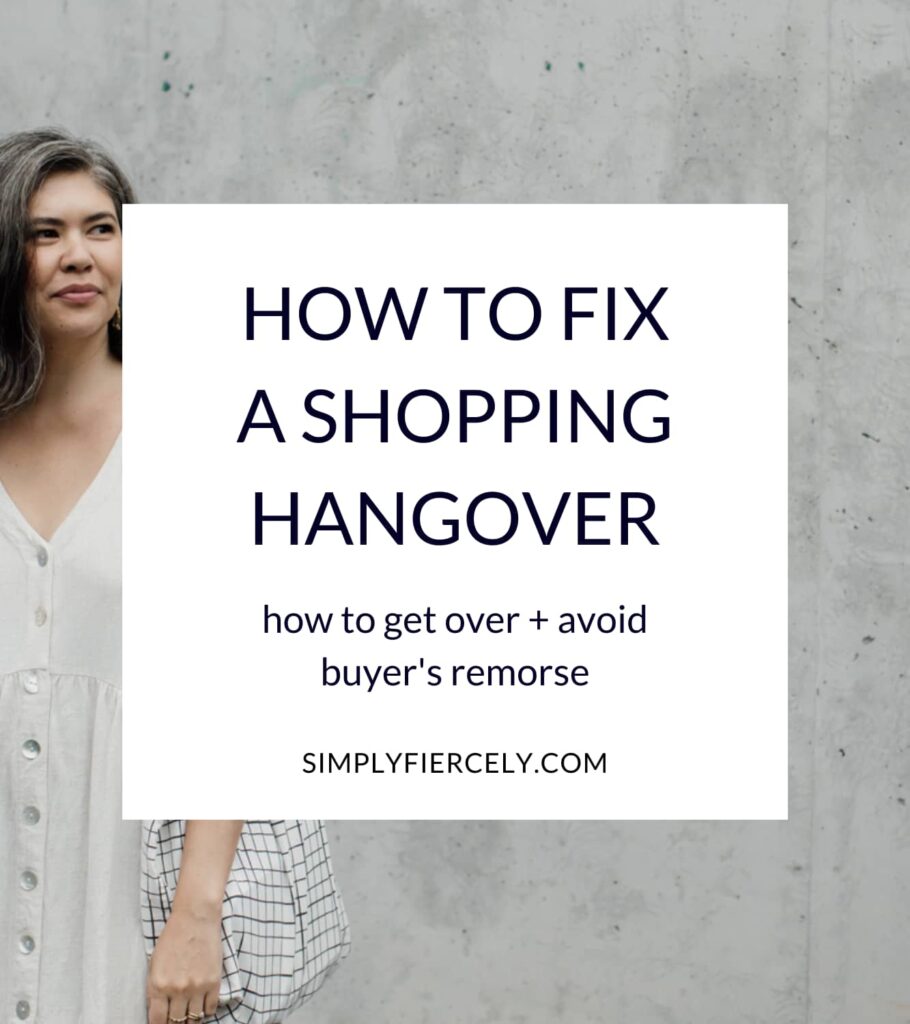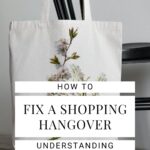Buyer’s remorse is a deep sense of regret or guilt after a shopping spree or big purchase (it feels a lot like a shopping hangover!). Here are a few tips that will help you get over buyer’s remorse and avoid it in the future.
The year is 2009. It’s 6 am and I’m in my car, driving home from the Black Friday sales.
I can’t remember what I bought or how much I spent after shopping all night, but I do remember this: feeling sick to my stomach. I was full of guilt, shame and regret.
The sun was barely up, but I was already keenly aware of my bad choices. I’d spent more than I could afford on things I didn’t really want. I felt anxiety rise in my chest as I thought about it, so I quickly shut down those feelings.
Instead, I thought about my “bargains” and how impressed my friends would be with my new finds. If I could only convince them, then maybe I could convince myself …
As a shopaholic turned minimalist, I’ve been there. I thought I could never stop my compulsive shopping, but it turns out I was wrong. Here are three things you can do to overcome buyer’s remorse and avoid it in the future.

What is Buyer’s Remorse?
Spending money and going on a shopping spree is a lot of fun … until it isn’t.
Buyer’s remorse is an overwhelming sense of shame, guilt or regret that we feel after a big purchase. Sometimes you notice it as soon as you hand over your credit card. You know it’s too much, but it feels too late to walk away. A line’s crossed, so you just go with it.
Other times, it sneaks up on you. You’re feeling great, on a shopper’s high after your new purchases—until the next morning. You wake up with a deep sense of dread in the centre of your chest. (This is where the term “shopping hangover” comes from!)
The Psychology of Buyer’s Remorse
A common theory is that buyer’s remorse is a result of cognitive dissonance. We think that we’re one type of person—someone who makes smart, intentional purchases—but then a shopping binge or overspending challenges our beliefs.
I’m not a psychologist, so I don’t know all the inner workings of the human mind. But I do have firsthand experience with years of compulsive shopping, and I think this theory is spot on.
I didn’t want to believe or acknowledge that I was the type of person who consistently made bad choices with money, and admitting it to myself or others was inconceivable.
Instead, I leaned into the role of a shopaholic. I didn’t have a problem because I loved shopping! I was proud of my enormous shoe collection and the massive shopping sprees. I was choosing to overspend because I wanted to.
This story felt comforting. The cognitive dissonance was gone (or at least minimised) because my actions were in alignment with who I said I was.
But here’s the problem. Deep down, I knew that my mindless shopping habit was holding me back from the life I really wanted. My “love” of shopping was really just a farce to keep me safe, which is why the shame, guilt and regret kept returning.
If you can relate, here are three things that will help you deal with buyer’s remorse and avoid it in the future.
How to Get Rid of Buyer’s Remorse
First, damage control.
If you’ve spent too much, the first thing to do is return what you can.
I know this is hard. It’s a pain to go back to the shops or trek across town to the post office. It takes time, and more importantly, energy. Returning something means admitting you made a bad choice and that doesn’t feel good. (Remember, cognitive dissonance?)
It’s so much easier to try and talk yourself into “loving” your purchase. Deep down, you probably know you’ll never wear those heels, or that dress is a bit too small—but your inner voice can be convincing.
You start listing all the places where you’re sure that you’ll wear the shoes. Or you tell yourself that you’re only a week or two away from losing that “last five pounds”. And besides, it was such a bargain! It’s best to keep it all … just in case.
If you catch yourself in these tall tales, just remember this. Your gut knows. If you have even the slightest of doubts, then listen to them. Go back to the shops and return your purchases.
But what if you can’t return something? Or you really don’t want to?
If you can’t return something (maybe it was a final sale, for example), but you know you’ll never use it—then declutter it now. Don’t let it live in the back of your closet for five years before letting go.
Holding on to clutter has a physical, mental, and emotional cost. For most things, the resale value drops with time. Plus, there’s the weight of cleaning, caring, and feeling guilty about your purchases. Just let go and cut your losses.
Alternatively, if you genuinely want to keep something, then stop beating yourself up. Even if it was a “bad” purchase, obsessing over it won’t help things. Shame will only keep you from moving forward (more on that in a minute).
For now, just know that there are only two reasonable options: let go or forgive yourself.

Next, learn from your mistakes.
You can’t change the past, but you can learn from it.
When we shop or spend too much, it’s often a way of coping with difficult emotions. Maybe you’re feeling insecure about your body, so you shop for clothes that you think will “fix” you.
Or you had a bad day—perhaps a stressful dinner with extended family left you feeling like you’re not up to standard. A trip to the shops is a convenient way to “let off some steam”.
Overspending and impulsive shopping can also be a response to environmental triggers. Your favourite influencer shares a new lipstick or a toy that she just bought for her daughter. Without realising it, you find yourself reaching for your phone and clicking “add to cart” too.
Whatever the circumstances that drive you to shop, just know that self-awareness is your friend. Don’t beat yourself up about what happened. Trust me; this will only lead to you shutting down and going on the defence.
Instead, practice compassionate curiosity. Why do you keep buying stuff you don’t need? The more you understand your behaviour, the more empowered you are to change.
Recognising your patterns can also help alleviate any guilt or shame you’re feeling. You’re not “broken” or “stupid”. You’re just human, and you struggle with things like everyone else.

Finally, make a plan.
Take a deep breath, forgive yourself, and then look for compassionate ways to do better in the future.
If emotional challenges trigger your shopping problem, can you plan ahead by creating a robust self-care plan? Instead of turning to the shops for support, start journaling or spend some time outdoors.
This is also an opportunity to review your personal boundaries. Do you need to unsubscribe or unfollow anyone? Or perhaps let others know what discussion topics are off the table?
There are no one size fits all answers, and it might take a bit of trial and error (or even professional support). But that’s OK. Don’t aim for perfection because—spoiler alert—you won’t find it. But what you can do is approach life like one big experiment.
Aim to do better next time, and if you don’t, know that it’s another learning experience. Just keep coming back to compassionate curiosity. I promise that it won’t lead you astray.
Have you ever struggled with a shopping hangover or buyer’s remorse? How did you handle it? Let us know in the comments!
Related Post: How I Became a Minimalist (From Shopaholic to Living With Less)



This was a wonderfully written blog post, but the deluge of ads on your site work against it and everything you’ve just written. Just from reading this one blog post, I was inundated with retail ads trying to get me to click over and spend money. Have you ever thought about limited ads or perhaps getting rid of them altogether on this site?
Thank you for your thoughtful feedback about the ads on my website.
I appreciate they can be annoying but I’m afraid I’m not in a position to remove them at the moment.
I did attempt to run my blog ad-free for several years but sadly, sales of my online courses were never enough to cover my operating expenses (which have increased each year as my blog has grown).
During that time, I continued writing at a considerable personal cost— I spent thousands of dollars and invested hundreds of hours of my time— but I did so happily because I was passionate about sharing what I’ve learned.
I still have this vision but after the birth of my children, my priorities had to shift. Running ads was (and still is) the only way I can justify spending so much time and money on this site. (I should mention running this blog is my full-time job.) I have considered offering my articles ad free via a paid membership but there hasn’t been much interest.
Of course, I respect your time as well and if you choose to stop reading because of the ads, then I 100% understand your decision.
But if you do continue to support my blog, then I thank you for your generosity. Every ad you view buys me time with my family and in addition, allows me to continue writing free content for those who cannot afford my paid programs.
Wishing you all the best and thank you again for taking the time to share your feedback.
Hi, my name is Siew Wong, I just started to read your blog, honestly, I am very enjoying reading it. Simple and right to the point. Thank you so much for all your hard work! I will continue reading. This becomes my daily list now! I wish you all the best !